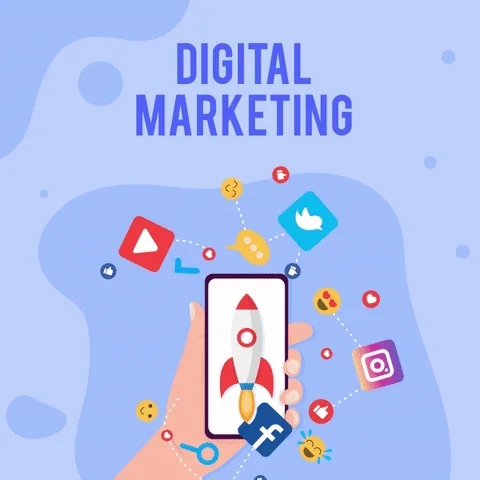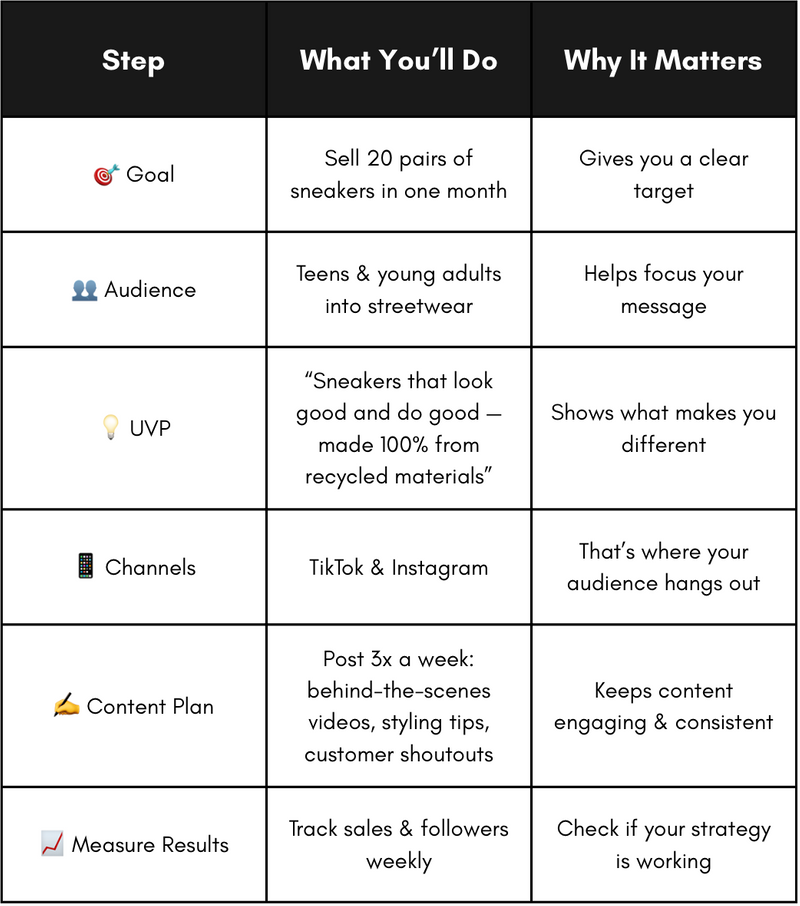Have a business or product you want to advertise more effectively, but don't know where to start?

Make your own marketing strategy by finding your target audience and goals, developing a unique value proposition, and choosing the proper marketing channels, like social media.
Step 1: Find Your Target Audience & Set Your Goals 🎯
Know Your Audience
Think of your ad like sending a text. You wouldn’t text everyone in your contacts, right? You’d send it to someone who cares.
 Your target audience is that “someone.” They’re the people who actually need, want, or are curious about your offering.
Your target audience is that “someone.” They’re the people who actually need, want, or are curious about your offering.
Quick Tip👇
Ask yourself:
Who would use or love my product/service?
What age group or interest fits best?
Where do they hang out online?
Example
Let’s say you’re promoting a local sneaker brand. Your audience might be:
Teens who love streetwear
Sneaker collectors
Young adults looking for affordable but stylish kicks
Define Your Goal
Your goal gives direction. Are you trying to:
Get more followers?
Drive traffic to your website?
Increase sales?
Be specific! “Sell 20 pairs of sneakers this month” is better than “get more sales.” 🎯
Scenario Quiz 1: Finding Your Audience & Goals 🧠
Scenario: You’re starting a small online store selling handmade friendship bracelets. You want more people to check out your Instagram shop.
Question: Which of the audience members matches the following goal: "Grow Instagram followers by 15% this month"?
A. Parents
B. Teens and college students
C. Corporate executives
D. General public
Quiz
Which option is the best?
Step 2: Develop Your Unique Value Proposition (UVP) 💡
A unique value proposition (UVP) is what makes you stand out — it’s the “Why you?” message that tells people why your product or service is worth their attention.

Your UVP answers:
Why should someone choose you over everyone else?
It’s what's specialabout your product or service. It tells your target audience why they should care about what you're offering.
Example
If your sneakers are made from recycled materials, your UVP might be:
Sneakers that look good and do good — made 100% from recycled materials.
Keep it short, honest, and memorable. And avoid buzzwords! Speak like a human, not a robot.
Step 3: Choose the Right Marketing Channels 📱
 Now comes the fun part — where do you share your message?
Now comes the fun part — where do you share your message?
You wouldn’t advertise your teen fashion brand in a newspaper, right? You’d go where your audience already is.
Examples
Snapchat or TikTok→ great for short, catchy videos 👻
Instagram → perfect for visuals and stories 📸
Discord or Reddit → great for niche communities 💬
Etsy, Shopify, or Depop → if you’re selling products 🛍️
Pro Tip 👇
Each platform has its vibe. TikTok loves authenticity and humor. Instagram loves aesthetics. Match your ad style to the platform.
Scenario Quiz 2: Applying the Whole Strategy 🧠
Scenario: You’re launching a new smoothie brand made with local fruit. You want to grow awareness among young adults who care about health and sustainability.
Question: Which marketing channel fits best?
A. Print flyers around town
B. Newspaper ads
C. LinkedIn posts
D. TikTok videos & Instagram reels
Quiz
Which is the best option?
Putting It All Together: Developing a Marketing Strategy 🧭
So how do these steps turn into a strategy? Think of a marketing strategy like your map. It’s the roadmap showing how you’ll reach your goals. Here’s what a simple strategy might look like:
Example: Local Sneaker Brand Strategy
 To hear an audio explanation of the above chart, click the play button on the audio plaer below:
To hear an audio explanation of the above chart, click the play button on the audio plaer below:
Notice how everything connects? 💡 Your strategy is just all your smart choices — audience, UVP, channel, content — working together toward one clear goal.
When you’re done, ask yourself:
Is my message clear and consistent?
Does every part of my plan connect back to my main goal?
If yes — you’ve got yourself a strategy!
Helpful Resources 🔗
 These steps were a way to get the ball rolling for you. Below you'll find some other resources you'll be able to look into as you work on effectively advertising your product or business:
These steps were a way to get the ball rolling for you. Below you'll find some other resources you'll be able to look into as you work on effectively advertising your product or business:
How to Create a Digital Marketing Budget: 4 Considerationsis good for big picture thinking about tradeoffs and where money should go.
How to Create a Social Media Marketing Budget is a good introduction to the components (content, ads, tools) and how to align with goals.
Social Media Budgets: Planning, Benchmarks & Optimization Strategies breaks down how much companies spend, how to allocate across content, ads, experimentation, etc.
Take Action
Here's the checklist broken down for you as you begin your process:
Your feedback matters to us.
This Byte helped me better understand the topic.
